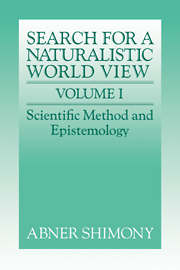Book contents
- Frontmatter
- Contents
- Acknowledgments
- A THE DIALECTIC OF SUBJECT AND OBJECT
- B PERCEPTION AND CONCEPTION
- 4 Perception from an evolutionary point of view
- 5 Is observation theory-laden? A problem in naturalistic epistemology
- C EPISTEMIC PROBABILITY
- D INDUCTIVE INFERENCE: THE DIALECTIC OF EXPERIENCE AND REASON
- E FACT AND VALUE
- Index
4 - Perception from an evolutionary point of view
Published online by Cambridge University Press: 21 December 2009
- Frontmatter
- Contents
- Acknowledgments
- A THE DIALECTIC OF SUBJECT AND OBJECT
- B PERCEPTION AND CONCEPTION
- 4 Perception from an evolutionary point of view
- 5 Is observation theory-laden? A problem in naturalistic epistemology
- C EPISTEMIC PROBABILITY
- D INDUCTIVE INFERENCE: THE DIALECTIC OF EXPERIENCE AND REASON
- E FACT AND VALUE
- Index
Summary
Recently there have been several extremely interesting expositions of a thesis which is implicit in the evolutionary view of man, but which had (at least after the early waves of enthusiasm for Darwinian ideas) been rather neglected: that human perceptual powers are as much a result of natural selection as any feature of organisms, with selection generally favoring improved recognition of objective features of the environment in which our pre-human ancestors lived. That these studies of perception from an evolutionary point of view have not influenced most writers on epistemology is one of many symptoms of the continuing dissociation of philosophy from the natural sciences. To be sure, at least one reason for abstaining from evolutionary considerations in epistemological inquiry is obvious and weighty: namely, to avoid begging questions, since the evolutionary view of human perceptual powers seems to be antecedently committed to the propositions of a specific epistemological position, the causal theory of perception. This reason will appear decisive, however, only if the mission of epistemology is conceived to be the establishment of an irrefutable foundation upon which the entire edifice of knowledge is to be erected. If, instead, epistemology is conceived to have a dialectical structure, in which the starting point of an investigation is subject to subsequent correction and refinement, then one can legitimately ask whether evolutionary considerations, despite their presuppositions, can strengthen the case for the causal theory.
- Type
- Chapter
- Information
- The Search for a Naturalistic World View , pp. 79 - 91Publisher: Cambridge University PressPrint publication year: 1993



